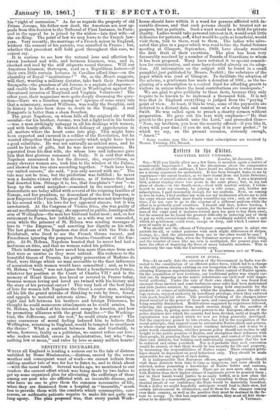POLICE IN INDIA.
Sin—At an early date the attention of the Government in India was di- rected to the constitution of an efficient police force, which led to a change in the old system already existing on our occupation of the country, by sub- stituting European superintendence for the direct control of Native agents. On the acquisition of new territory, our traditional policy was simply car- ried out, by imposing on the native inhabitants our civil staff with magis- terial authority. Under the rule of their own chiefs, it was found that amongst these ancient and semi-barbarous races order had been maintained and rude justice satisfied, by communities being held responsible for the misdeeds or crimes of individuals ; whilst the headmen, under the old vil- lage system, enjoyed authority by hereditary privilege, which they enforced with much beneficial effect. The practical working of the changes intro- duced resulted in the power of these men, and consequently their influence being sensibly diminished. Modifications suggested by experience followed, relieving the magistrates from much onerous detail, at the sacrifice of valuable time, by giving more direct powers to the European officers of the police districts into which the country had been divided, until at length the organization was adopted which we now see being generally developed. But the experience gained by late events, has led to the recognition of the sound principle, that support must be extended to Native chiefs and princes, to whose charge much territory must continue intrusted ; and it may be a point worth consideration, whether present policy should not incline to add weight to the public position of Rajahs, and strengthen their influence with their people, by granting them the arrangement and control of the police in their own districts, but holding each individually responsible that the law be enforced and crime punished. Nor is it probable that such concession would be abused, or that there would be less security for life and property, by increasing the responsibilities of Native rulers. Their enlarged privi- leges should be dependent on good behaviour only. They should be made answerable for any neglect of such duties. It is indispensable that European officers, specially appointed, should visit these districts from time to time as inspectors, and none should be selected, unless possessing a knowledge of Native habits and customs, gained by residence in the country. There are no men more able to deal with Natives than their higher classes if legitimate power be granted them ; nor in their hands would justice be so easily bad, as is now often the case. There is a reasonable prospect that by extending to them these sub- stantial proofs of our confidence, the State would be materially, benefited. Such a policy we might hopefully anticipate would lead to their slow, but certain advancement in civilization, and fit them for the changes coming over their country, as well as the position they must be destined in the fu- ture to occupy. In this last important question, they must all feel them-


























 Previous page
Previous page